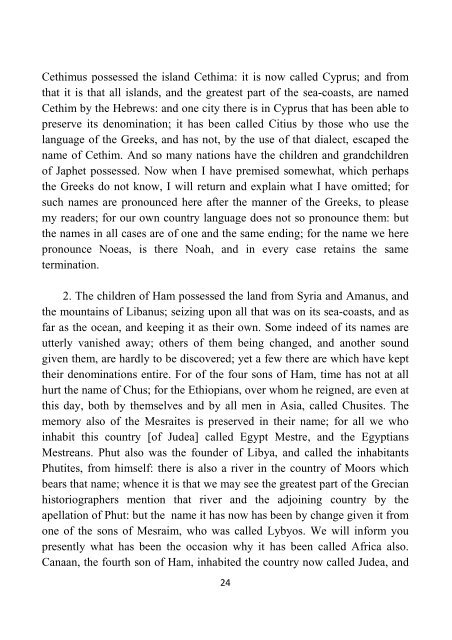From the Creation to the Death of Isaac - Flavius Josephus
- No tags were found...
Create successful ePaper yourself
Turn your PDF publications into a flip-book with our unique Google optimized e-Paper software.
Cethimus possessed <strong>the</strong> island Cethima: it is now called Cyprus; and from<br />
that it is that all islands, and <strong>the</strong> greatest part <strong>of</strong> <strong>the</strong> sea-coasts, are named<br />
Cethim by <strong>the</strong> Hebrews: and one city <strong>the</strong>re is in Cyprus that has been able <strong>to</strong><br />
preserve its denomination; it has been called Citius by those who use <strong>the</strong><br />
language <strong>of</strong> <strong>the</strong> Greeks, and has not, by <strong>the</strong> use <strong>of</strong> that dialect, escaped <strong>the</strong><br />
name <strong>of</strong> Cethim. And so many nations have <strong>the</strong> children and grandchildren<br />
<strong>of</strong> Japhet possessed. Now when I have premised somewhat, which perhaps<br />
<strong>the</strong> Greeks do not know, I will return and explain what I have omitted; for<br />
such names are pronounced here after <strong>the</strong> manner <strong>of</strong> <strong>the</strong> Greeks, <strong>to</strong> please<br />
my readers; for our own country language does not so pronounce <strong>the</strong>m: but<br />
<strong>the</strong> names in all cases are <strong>of</strong> one and <strong>the</strong> same ending; for <strong>the</strong> name we here<br />
pronounce Noeas, is <strong>the</strong>re Noah, and in every case retains <strong>the</strong> same<br />
termination.<br />
2. The children <strong>of</strong> Ham possessed <strong>the</strong> land from Syria and Amanus, and<br />
<strong>the</strong> mountains <strong>of</strong> Libanus; seizing upon all that was on its sea-coasts, and as<br />
far as <strong>the</strong> ocean, and keeping it as <strong>the</strong>ir own. Some indeed <strong>of</strong> its names are<br />
utterly vanished away; o<strong>the</strong>rs <strong>of</strong> <strong>the</strong>m being changed, and ano<strong>the</strong>r sound<br />
given <strong>the</strong>m, are hardly <strong>to</strong> be discovered; yet a few <strong>the</strong>re are which have kept<br />
<strong>the</strong>ir denominations entire. For <strong>of</strong> <strong>the</strong> four sons <strong>of</strong> Ham, time has not at all<br />
hurt <strong>the</strong> name <strong>of</strong> Chus; for <strong>the</strong> Ethiopians, over whom he reigned, are even at<br />
this day, both by <strong>the</strong>mselves and by all men in Asia, called Chusites. The<br />
memory also <strong>of</strong> <strong>the</strong> Mesraites is preserved in <strong>the</strong>ir name; for all we who<br />
inhabit this country [<strong>of</strong> Judea] called Egypt Mestre, and <strong>the</strong> Egyptians<br />
Mestreans. Phut also was <strong>the</strong> founder <strong>of</strong> Libya, and called <strong>the</strong> inhabitants<br />
Phutites, from himself: <strong>the</strong>re is also a river in <strong>the</strong> country <strong>of</strong> Moors which<br />
bears that name; whence it is that we may see <strong>the</strong> greatest part <strong>of</strong> <strong>the</strong> Grecian<br />
his<strong>to</strong>riographers mention that river and <strong>the</strong> adjoining country by <strong>the</strong><br />
apellation <strong>of</strong> Phut: but <strong>the</strong> name it has now has been by change given it from<br />
one <strong>of</strong> <strong>the</strong> sons <strong>of</strong> Mesraim, who was called Lybyos. We will inform you<br />
presently what has been <strong>the</strong> occasion why it has been called Africa also.<br />
Canaan, <strong>the</strong> fourth son <strong>of</strong> Ham, inhabited <strong>the</strong> country now called Judea, and<br />
24

















